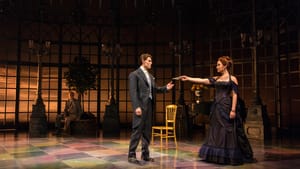Stay in the Loop
BSR publishes on a weekly schedule, with an email newsletter every Wednesday and Thursday morning. There’s no paywall, and subscribing is always free.
Eyes wide shut
McCarter Theatre Center presents Douglas McGrath's 'The Age of Innocence'

The Gilded Age takes center stage in The Age of Innocence, at McCarter Theatre Center in Princeton, New Jersey. Douglas McGrath adapts Edith Wharton’s Pulitzer-Prize-winning novel, capturing the opulence of 1870s New York but largely ignoring the source material’s sharp subtext.
Pomp and pageantry
Instead, McGrath and director Doug Hughes provide an elegant, empty pageant. John Lee Beatty’s grand ballroom set, seductively lit by Ben Stanton, ranks among the most beautiful I’ve seen on the Berlind Stage. Linda Cho ravishingly costumes the large ensemble cast. The production even includes an onstage pianist (Yan Li), who constantly underscores the brisk, intermissionless distillation of Wharton’s grand novel.
Eye-catching though it all may be, McGrath’s treatment misses the point Wharton set out to make nearly 100 years ago. Looking back on the world in which she grew up, she unsentimentally showed how social custom and the expectations of privilege can trample the hopes and happiness of those yoked to it. She critiqued a culture that put more weight in outward appearances than inward feelings. McGrath, by contrast, revels in it.
The result is a fusty memory play, narrated by a character simply called the Old Gentleman (Boyd Gaines), looking back at his youth from roughly the time of the novel’s writing. The script allows no ambiguity: he is actually Newland Archer, the young society lawyer on whom Wharton’s plot turns.
This device should produce a certain level of wryness, of someone nearing the end of his life casting his eyes backward and examining the follies of youth with 20/20 hindsight. Tennessee Williams brilliantly accomplished this in The Glass Menagerie, and Paula Vogel employed the frame to chilling effect in How I Learned to Drive. Although Gaines haunts the stage, observing his younger self and occasionally mouthing his doppelganger’s lines, the result is merely dotty, never haunting.
Between desire and duty
In the 1870s, Newland (Andrew Veenstra) falls under the spell of Countess Ellen Olenska (Sierra Boggess), cousin to his properly demure fiancée, May Welland (Helen Cespedes). In Wharton’s novel, Ellen serves as a disruptive figure — all but divorced from her roué of a husband, living alone in unfashionable digs, more interested in life’s sensual pleasures than polite society’s strict expectations.
Newland is left to choose between desire and duty — in many ways, Wharton anticipates Freud’s theory of id and ego, the psychic pull of passion and the tight tether of respectability. Yet, onstage, the duality never really cooks. Veenstra and Boggess fail to convey their characters’ combustible chemistry. A sense of danger never creeps into their flirtation. By the time they share a point of reckless abandon late in the play, the fires have mostly cooled.
Cespedes imbues May with a forlorn awareness of her intended’s wandering affections, though she mostly does this without help from the script. Some fine supporting performances emerge — Darrie Lawrence is particularly good as May’s iconoclastic grandmother — but the minor characters hardly grow into anything other than types.
It’s unfair to judge anyone against Wharton’s profound skill as a stylist, but I missed her ability to infuse even the most insignificant figure with an inner life.
There’s not much inner life to be found anywhere in this Age of Innocence, and that’s a shame. It’s all shiny surfaces: pretty, but hollow.
What, When, Where
The Age of Innocence. By Douglas McGrath, Doug Hughes directed. Through October 7, 2018, at McCarter Theatre Center, 91 University Place, Princeton, New Jersey. (609) 258-2787 or mccarter.org.
Sign up for our newsletter
All of the week's new articles, all in one place. Sign up for the free weekly BSR newsletters, and don't miss a conversation.

 Cameron Kelsall
Cameron Kelsall